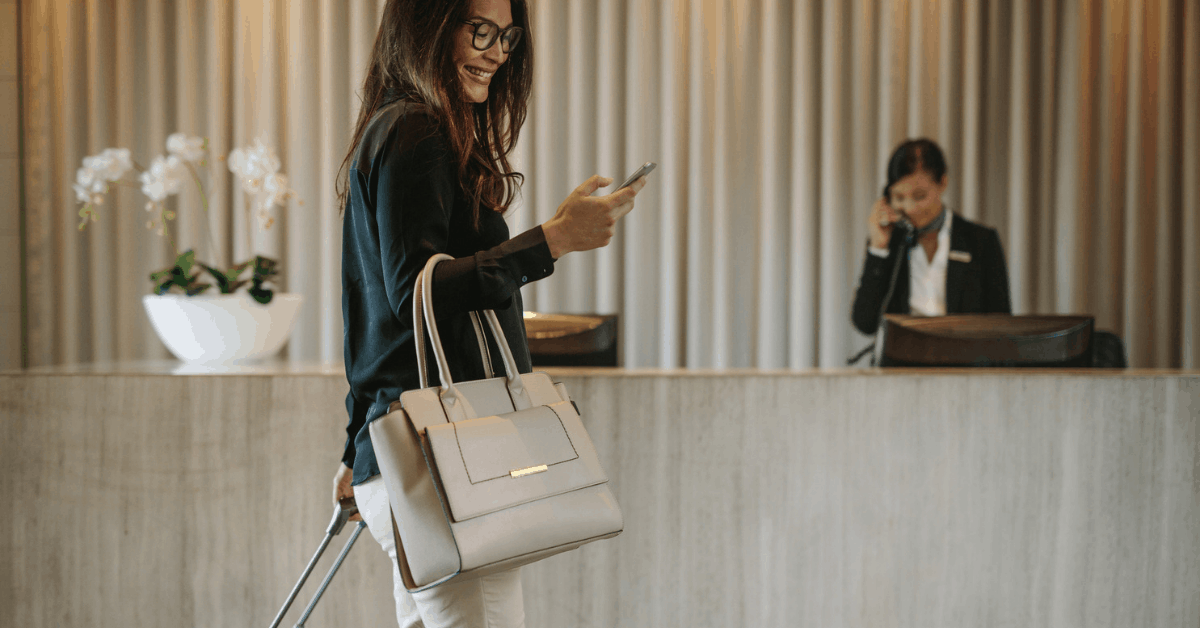Technology is changing the hotel experience, letting you check-in, unlock your door, order room service, check out, and store luggage without having to speak to a soul – but is that what guests really want?

With the rise of robots, artificial intelligence, and chatbots, technology is taking on tasks previously only be done by humans, which means we’re spending more time interacting with tech and less with each other. Hotel stays are no exception.
Imagine this: You check-in at a kiosk with a few taps of a screen then it’s up to your room which you unlock through the hotel’s app on your phone. Drop your bags, kick off your shoes – it’s time to order room service. You open the app, punch in your order, and wait for a robot to deliver your dinner. Need a restaurant reservation, more towels, or got a question about hotel amenities? Message an AI chatbot or call a virtual operator. When it’s time to leave, it’s another few taps on the app to check out.
Technological advances mean you can now spend a night in a hotel without interacting with staff but is this the stuff of dreams, nightmares, or simply, the future?
Room service – robot butlers
In the growing demand for speed and convenience, technology is, as a by-product, reducing the time guests spend interacting with staff during their hotel stay. Apps, such as Hilton Honors, offer guests the option to request items to be brought to their room via their smartphone without having to dial down to reception. While in many hotels these items are then delivered by staff, this isn’t always the case.

Self-driving devices, or robot butlers, can often be found roaming the halls across many hotels, taking elevators and smoothly avoiding obstacles, including people, while making deliveries to rooms in M Social Singapore and Vdara Hotel & Spa in Las Vegas.
Daniel Gillaspia, founder of travel blog UponArriving, experienced one such butler when staying at H Hotel Los Angeles, where an autonomous robot named HANNAH delivered his room service without the need for staff assistance.
“There was no need for a tip and the delivery was pretty swift,” he said.
Although hot meals and open containers are harder to transport, drinks, toiletries, and packaged food are frequently making their way to guests’ doors via robots, eliminating the need to look presentable when answering the door to the delivery staff.
“Plus, you don’t feel like anybody is judging you on your snack selection,” Gillaspia said.
Questions and requests – chatbots and telephone AI
Traditionally when you need advice, recommendations, or have a problem, you’d have to call the front desk or speak with the hotel’s concierge, but new innovations, such as artificial intelligence and augmented reality, are allowing guests to access this information from within their rooms.
RLH Corporation, formerly Red Lion Hotels, launched a virtual agent across its 1,400 hotels last month, the first of its kind in the industry. This means, when making reservations, your call will be handled by AI-powered technology instead of a member of staff in hotels such as the Hotel RL Brooklyn and Signature San Francisco. Although the tech is only available for making, changing, or canceling reservations right now, the company plans to roll out the AI agent out to handle other types of calls, such as those about its rewards program.
Chatbots can also answer guest’s questions about the hotel’s amenities or the surrounding area, such as International Hotel Group Hotel Indigo’s bot who communicates through Facebook Messenger. And, if you prefer speaking with staff, more and more hotels are offering the ability to get in touch via instant messages. Four Seasons Hotels and Resorts, for example, launched Four Seasons Chat where guests can ask questions and make requests directly with staff via Facebook Messenger, WeChat, and SMS instead of phone or face-to-face communication.
But it’s when guests have problems that the balance between man and machine tips, with studies showing 48 percent of consumers aren’t confident chatbots can solve their concerns and 70 percent prefer speaking with a human representative.
Checking in and out – facial recognition, apps, and kiosks
Hotel tech platform Nuvola recently announced their partnership with Kairos, a facial recognition AI company, to bring the technology to a swathe of hotels. Though hotels in China, such as Alibaba’s FlyZoo, are already using facial recognition for check-in and unlocking doors, this is a first in the hospitality industry in the U.S. The software promises to speed up key moments of hotel stays, including check-in and when making transactions where name recognition is needed, such as when dining within the hotel.
Many hotels have already made the arrival process completely staff free with mobile check-in and keyless entry. Marriott’s Bonvoy app, for example, allows guests to check-in ahead of time, notifies them when their room is ready and allows them to unlock their door with their smartphone.

Another option is the check-in kiosk in lobbies. These are championed by tech-savvy lifestyle hotel YOTEL where Simon Willis, brand director at YOTEL, stated guests are becoming more and more familiar with this self-service style of check-in.
“Today people are very used to and comfortable with using self-check-in kiosks,” he said.
“Guests can check-in under a minute and get on with what is important to them.”
While facial recognition is expected to speed things up, apps and kiosks aim to cut out the traditional front desk model altogether, removing the long lines and small talk after a long flight.
Many hotel chains use the same staff-free check-in process to allow guests to check themselves out through apps or self-service kiosks. YOTEL’s NYC branch in Midtown Manhattan provides one final staff-less experience before guests leave; a robotic luggage concierge called YOBOT.
If you’ve checked out but still have time to kill, traditionally you would ask staff to store your bags but at YOTEL NYC, a hydraulic arm takes your luggage for you, places it in one of its 150 lockers, and gives you a receipt to use when collecting your bags.
Willis explained that it allows luggage to be stored quickly without any assistance.
“YOBOT in New York was the first automated luggage concierge in the world and works hard for us every day, freeing our crew to interact with guests and get on with more complicated tasks,” he said.
Man vs machine – what’s best and what’s next?
So, could we soon be visiting hotels without any staff at all? Probably not. While guests obviously value the speed, ease, and judge-free snacking that comes with these technological advancements, many still crave a human interaction with some going as far as to seek it out.
Anne Fletcher, co-founder and CEO of Travel Soul, said she was happy using hotel apps to check-in and out but preferred the human touch when in need of anything further.
“Even when I have a simple stay with no need to interact with staff, I still find myself engaging with them in general pleasantries,” she said.
“I find myself more inclined to choose a hotel based on their friendly staff and less on their tech advances.”
Perhaps the best hotel model for hotels of the future is finding a balance between man and machine, where guests can choose between tech and staff interaction when it suits them. When discussing tech features in smart hotels, studies have shown that 69 percent of hotel guests would prefer to have the choice to opt into using them than be automatically enrolled and opt-out.
Willis from YOTEL believes technology in hotels can actually lead to better communication between staff and guests instead of replacing it altogether.
“Our tech and robots are not there to replace the human interaction, but actually play a vital role in amplifying it,” he said.
“Because we have done away with so many mundane tasks and paperwork, our team has more time to spend on actually interacting with guests.”



